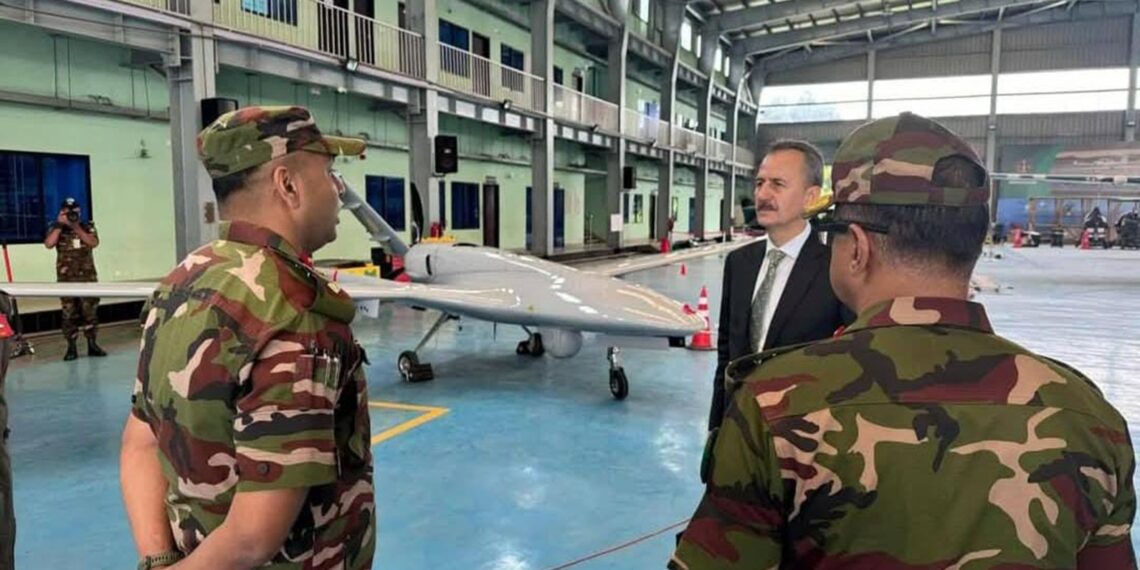A few days after Bangladesh’s Navy chief Admiral Mohammad Nazmul Hassan left for the United States via Turkey, the country’s Air Chief Marshal Hasan Mahmood Khan today left for Istanbul to hold a meeting with his counterpart and discuss the possibilities of acquiring naval assets.
Defence ties between Bangladesh and Turkey developed when Sheikh Hasina was in power and this was reflected in the acquisition of military hardware, including long-range artillery guns, howitzers and tanks.
But there has been a definite deepening of Bangladesh-Turkey defence ties since the Mohammad Yunus-led interim government took charge in August 2024.
While Bangladeshi defence analysts rue the adverse impact this growing relationship will have on China, which has traditionally been the main supplier of a wide range of weapons and defence equipment to Bangladesh, the cancellation of Army chief Waker-uz-Zaman’s June-end visit to Beijing, which was at the invitation of the People’s Liberation Army (PLA), marks a significant change in tack.
Information accessed by Northeast News show that Air Chief Marshal Mahmood Khan, accompanied by a Group Captain and a Squadron Leader, left Dhaka today on an Emirates flight (No. EK-585) for Istanbul to attend the 17th International Defence Industry Fair to be held between July 22 and 27. The three-member team will return to Dhaka on July 28.
Earlier, Bangladesh’s Chief of Naval Staff Admiral Mohammad Nazmul Hassan left for the United States, supposedly on leave, on July 16.
However, Admiral Hassan would be on an official visit to Turkey between July 22 and 25 before proceeding for Moscow on a two-day (July 27-29) visit.
Admiral Hassan’s Istanbul and Moscow visits follow a December 24, 2024, invitation from the Commander of the Turkish naval forces and the Commander-in-Chief of the Russian Federation Navy on January 13, 2025.
The Turkey visits of Air Marshal Mahmood Khan and Admiral Hassan follow the arrival in Dhaka of the country’s Defence Industry Secretary Haluk Gorgun to Dhaka on July 8.
Gorgun’s visit follows meetings between Bangladesh Industrial Development Authority (BIDA) Executive Chairman Chowdhury Ashik Mahmud Bin Harun with his Turkish hosts during a five-day visit to that country in May this year.
This indicated BIDA’s strong interest in building defence industrial complexes in Chittagong and Narayanganj with Turkish collaboration. Harun’s trip included a visit to the government-owned Makine ve Kimya Endustrisi (MKE) located at Kirikkale in Turkey’s Central Anatolia region.
Harun’s tour of the Turkish MKE yielded results with Gorgun’s two-day visit, which is being coordinated by Bangladesh Army’s Armed Forces Division. Gorgun met General Waker-uz-Zaman, Air Chief Marshal Hasan Mahmood Khan and Admiral Mohammad Nazmul Hassan.
More importantly, Gorgun also called on Chief Adviser Mohammad Yunus, a meeting which was coordinated by the Intelligence Directorate of the Armed Forces Division.
An advance six-member team from Turkey, led by a Country Expert Eren Azar landed at Dhaka’s Hazrat Shahjalal International Airport on July 7. Gorgun was accompanied by Turkey’s International Cooperation Department head Eftac Koca, Asia Pacific Division Regional Manager Alpkutay Sabik and Gorgun’s Chief of Staff Ismail Ipek.
ALSO READ: Justice Ashutosh Kumar sworn in as Chief Justice of Gauhati High Court
Bangladesh’s military hardware acquisitions from Turkey centred around the MKE Boran 105mm howitzers, 18 pieces of which were procured late last year with plans to expand the total units to 200 in the future, and the TRG-230/300 rocket systems. Besides, Dhaka is considering purchasing the Turkish-made Otokar Tulpar light tanks.
Defence ties between Bangladesh and Turkey deepened in 2018 when as many as 15 different types of military hardware, including the Bayraktar TB2 drones, were procured from Turkish manufacturers.
There are reports that Bangladesh and Turkey are prepared to enter into formal negotiations for realising a memorandum of understanding besides institutionalising a Defence Industrial Working Group which will supervise and manage “planning, policy alignment and execution”.















